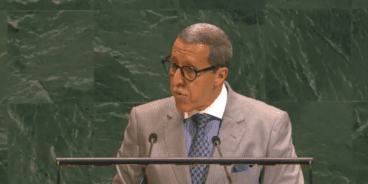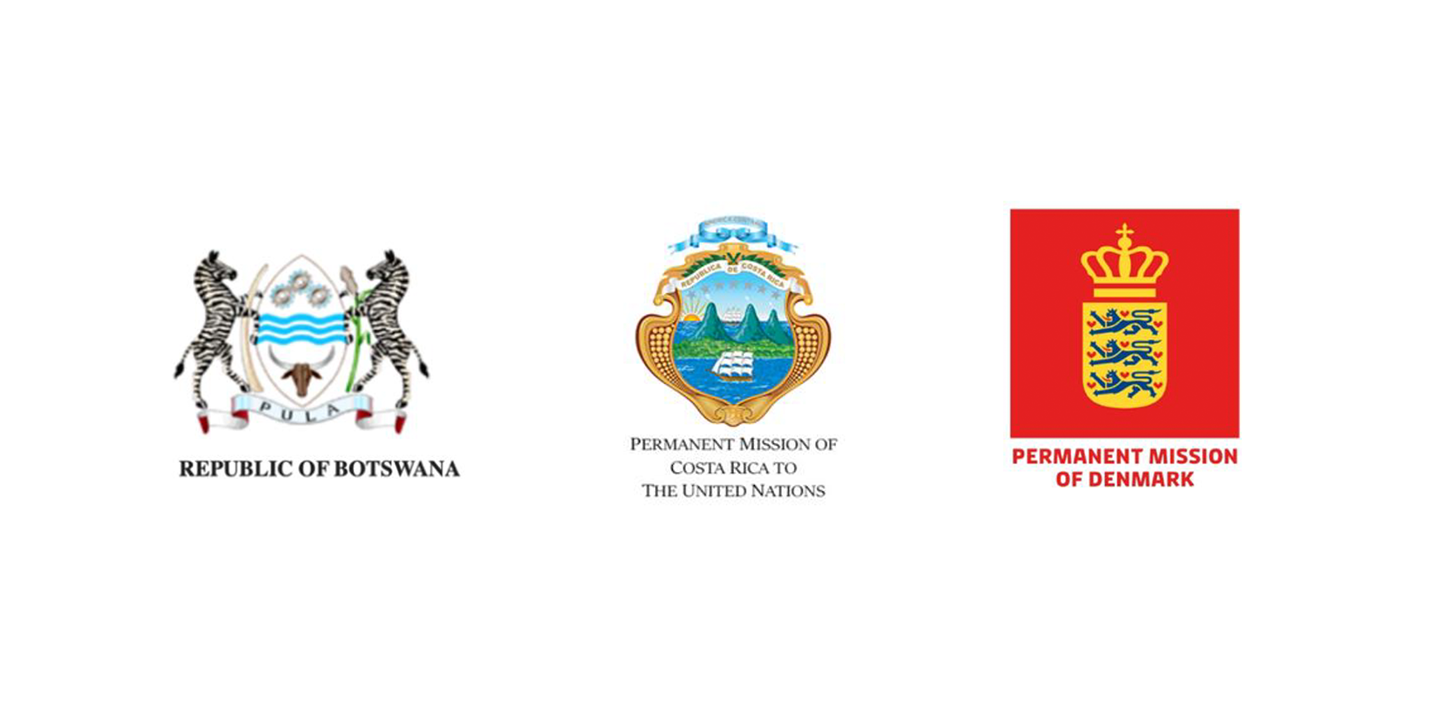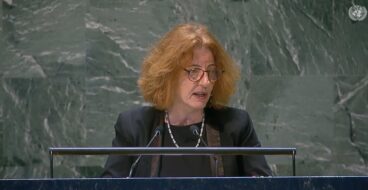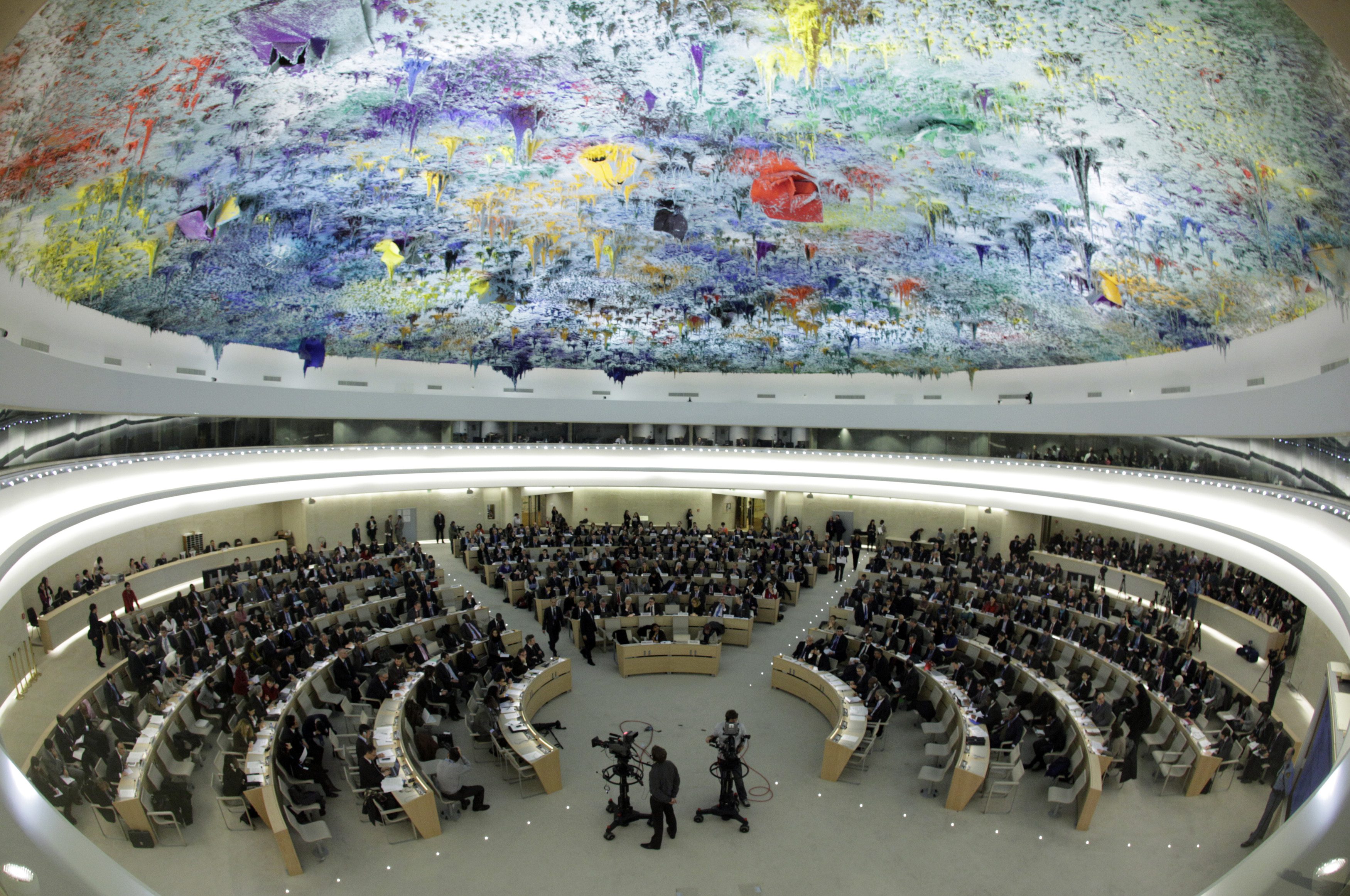

Statement delivered on behalf of members of the Group of Friends of R2P at the 2021 UN General Assembly Debate on R2P
I have the honor of delivering this statement on behalf of Argentina, Australia, Bangladesh, Belgium, Bosnia & Herzegovina, Botswana, Canada, Chile, Costa Rica, Cote d’Ivoire, Croatia, Czech Republic, Denmark, European Union, Finland, France, Germany, Ghana, Guatemala, Hungary, Ireland, Italy, Japan, Liberia, Liechtenstein, Luxembourg, Mali, Marshall Islands, Mexico, Morocco, Mozambique, Netherlands, New Zealand, Nigeria, Norway, Panama, Peru, Qatar, Republic of Korea, Rwanda, Romania, Senegal, Sierra Leone, Slovakia, Slovenia, South Sudan, Spain, Sweden, Switzerland, Tanzania, United Kingdom, United States and Uruguay, all members of the Group of Friends of the Responsibility to Protect, which is chaired by Botswana, Denmark and my own country, Costa Rica.
Today marks the twelfth year that the UN General Assembly is gathering to discuss how to implement the Responsibility to Protect, and the fourth time in the format of a formal debate.
This year’s debate is taking place at an unprecedented time, amidst a deadly global pandemic, unparalleled levels of human displacement, and escalating levels of conflict and violence, as well as violations of international humanitarian law and human rights violations and abuses. The COVID-19 pandemic has reinforced that global problems require multilateral solutions and that international law must be upheld.
Today’s debate is important for reaffirming our collective commitment to the Responsibility to Protect and to improve our responses to populations at risk of atrocities. One way of doing this is by supporting the draft resolution on the Responsibility to Protect and the prevention of genocide, war crimes, ethnic cleansing and crimes against humanity, which is being considered by this Assembly today. We call upon all Member States to vote in favor when action is taken on the resolution.
Mr. President,
Last year, we celebrated the 15th anniversary of the unanimous adoption of the Responsibility to Protect at the 2005 UN World Summit. Since then, important progress has been achieved by the UN, Member States and other stakeholders, including civil society, in advancing atrocity prevention at the local, national, regional and international levels.
International, regional and domestic actors have successfully created frameworks to identify triggers and risks, developed early warning mechanisms, and begun to institutionalize prevention mechanisms and partnerships for atrocity prevention. Important intergovernmental networks, such as the Group of Friends of the Responsibility to Protect in New York and Geneva, and the Global Network of R2P Focal Points, continue to grow.
Within multilateral fora, the Responsibility to Protect continues to serve as a powerful mobilizing call to action to prevent atrocities, as well as to address risks in specific country situations. To date, numerous resolutions from the Security Council, Human Rights Council and the General Assembly include a reference to states’ responsibility to protect their populations.
Last July, the Human Rights Council adopted its first thematic resolution on R2P, reflecting the growing institutionalization of and attention to R2P across the UN system. Several Human Rights Council-mandated Special Rapporteurs and investigative mechanisms have used the Framework of Analysis for Atrocity Crimes, developed by the UN Office on Genocide Prevention and R2P, to assess structural risk factors, particularly pervasive human rights violations, that could result in atrocity crimes.
More recently, stakeholders have increasingly explored important linkages with other related agendas, including peacekeeping, peacebuilding, Protection of Civilians, Women, Peace and Security, Sustaining Peace, the Sustainable Development Goals, Children and Armed Conflict, and Youth, Peace and Security. These UN protection agendas are complementary and mutually reinforcing, and their effective implementation contributes to upholding the Responsibility to Protect and vice versa.
In this context, we strongly support an inclusive approach to preventing atrocities — one that recognizes the critical role women and young people play in early warning, peacebuilding, peacekeeping, capacity building, and in building more cohesive, tolerant and resilient societies. Furthermore, we recognize that atrocities often include the perpetration of conflict-related sexual violence. We welcome last year’s report on the role of women and the Responsibility to Protect, as well as the efforts by the UN Special Representative of the Secretary-General on Sexual Violence in Conflict. Concrete steps should be taken to end all forms of gender inequality and related discrimination and violence and to empower women and girls as agents of change.
Mr. President,
While we highlight the valuable progress made, we must all recognize that the international community continues to fall short in upholding our collective Responsibility to Protect. Despite national and global efforts to better protect populations, there are currently more than 80 million people displaced as a result of conflict, persecution and atrocities and continue to require protection.
When atrocity situations are emerging or ongoing, it is incumbent upon multilateral institutions, most notably the Security Council, and Member States to take timely and decisive action. This can include diplomatic measures, targeted sanctions and review or suspension of military and trade agreements, among other measures.
We call on all Members of the Security Council to respond to and address the risk or commission of mass atrocities, noting in this context the support of many Member States for the ACT Code of Conduct and the French/Mexican initiative on veto restraint.
When the international community fails to prevent the commission of atrocities, we need to ensure that perpetrators are held accountable. This is not only needed as a measure of justice for victims, but also to uphold international norms, prevent the recurrence of such crimes and for long-term peace and reconciliation. More often than not, structural impunity is a direct cause of – and contributor to – the commission of atrocity crimes. Impunity needs to be addressed comprehensively, including by measures that promote truth-seeking, redress, reform and reconciliation for survivor and victims.
Combating impunity and promoting justice and accountability are thus key components of R2P. We urge Member States to comply with their international legal obligations and to duly investigate and prosecute persons responsible for atrocity crimes, and encourage Member States to strengthen judicial cooperation in that regard. Domestic prosecutions based on universal jurisdiction play an important part in the fight against impunity. Fact-finding missions, investigative mechanisms, commissions of inquiry, hybrid and international courts and tribunals, including the International Criminal Court, provide complementary avenues to enable accountability when and where options under domestic law prove insufficient.
Mr. President,
Noting the topic of this year’s R2P report by the Secretary-General, we would like to reaffirm our full support to the UN Office on Genocide Prevention and the Responsibility to Protect. We encourage the Secretary-General’s two Special Advisers on Genocide Prevention and R2P respectively to use their leadership roles to advance mass atrocity prevention, particularly in the current crises around the world. This includes constructive engagement and open dialogue with Member States, sharing their specialized expertise, raising awareness about the causes and dynamics of atrocity crimes, and identifying measures that could be taken to prevent them. We encourage the Office to update the Framework of Analysis for Atrocity Crimes, and develop additional technical guidance. We welcome the Office’s statements on specific situations, thematic briefings and country analyses at various meetings, as well as the support the Office provides to Member States and regional organizations. We urge the Special Advisers to strengthen these efforts and to share their analyses with the wider UN membership and regularly provide the necessary early warning assessments and recommendations on how to prevent atrocities, including to the Security Council, General Assembly and the Human Rights Council.
We recognize the pandemic has triggered increasing levels of hate speech and incitement to violence that can heighten the risk of mass atrocities. We welcome the Office’s release of the UN Guidance Note on Addressing and Countering COVID-19 related Hate Speech, under the UN Strategy and Plan of Action on Hate Speech, to provide a pragmatic focus on upstream prevention in this regard.
We also recognize the important role national and international civil society can play in supporting the further advancement and implementation of R2P. In particular, we would like to thank the Global Centre for the Responsibility to Protect for their invaluable work as Secretariat of the Group of Friends, both in New York and Geneva.
In conclusion, Mr. President, we reiterate our call for all Member States to support the draft resolution under consideration today. Its adoption will allow us to continue discussing how best to realize the historic pledge we made in 2005.
Thank you.
Related Content


